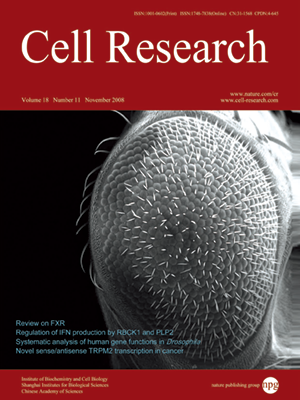
Volume 18, No 11, Nov 2008
ISSN: 1001-0602
EISSN: 1748-7838 2018
impact factor 17.848*
(Clarivate Analytics, 2019)
Volume 18 Issue 11, November 2008: 1096-1104
ORIGINAL ARTICLES
Negative feedback regulation of cellular antiviral signaling by RBCK1-mediated degradation of IRF3
Min Zhang1, Yang Tian1, Rui-Peng Wang1, Dong Gao1, Yan Zhang1, Fei-Ci Diao1, Dan-Ying Chen1, Zhong-He Zhai1 and Hong-Bing Shu2
1College of Life Sciences, Peking University, Beijing 100871, China
2College of Life Sciences, Wuhan University, Wuhan 430072, China
Correspondence: Hong-Bing Shu Dan-Ying Chen(shuh@whu.edu.cn dychen@pku.edu.cn)
Viral infection causes host cells to produce type I interferons (IFNs), which are critically involved in viral clearance. Previous studies have demonstrated that activation of the transcription factor interferon regulatory factor (IRF)3 is essential for virus-triggered induction of type I IFNs. Here we show that the E3 ubiquitin ligase RBCC protein interacting with PKC1 (RBCK1) catalyzes the ubiquitination and degradation of IRF3. Overexpression of RBCK1 negatively regulates Sendai virus-triggered induction of type I IFNs, while knockdown of RBCK1 has the opposite effect. Plaque assays consistently demonstrate that RBCK1 negatively regulates the cellular antiviral response. Furthermore, viral infection leads to induction of RBCK1 and subsequent degradation of IRF3. These findings suggest that the cellular antiviral response is controlled by a negative feedback regulatory mechanism involving RBCK1-mediated ubiquitination and degradation of IRF3.
Cell Research (2008) 18:1096-1104. doi: 10.1038/cr.2008.277; published online 19 August 2008
FULL TEXT | PDF
Browse 1910


